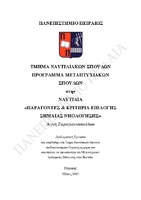Παράγοντες & κριτήρια επιλογής σημαίας νηολόγησης

Προβολή/
Θεματική επικεφαλίδα
Ναυτιλία -- Οικονομικές απόψεις ; Shipping -- Economic aspects ; Ships -- Registration and transfer ; Ships -- Registration and transfer -- Greece ; Ship transfers to foreign registry -- Economic aspectsΠερίληψη
Κάθε πλοίο, κατά την έναρξη της οικονομικής του ζωής, υποχρεούται να έχει ταυτότητα, δηλαδή σημαία. Εγγράφεται στο νηολόγιο μίας χώρας και αποκτά εθνικότητα. Ο ρόλος της σημαίας είναι καθοριστικός καθώς επηρεάζει την ασφάλεια του πληρώματος, του φορτίου, τη διαμόρφωση ασφαλίστρων για κάθε ταξίδι και πολλά άλλα. Στην παρούσα διπλωματική θα αναλυθούν οι παράγοντες και τα κριτήρια που καθορίζουν την επιλογή σημαίας νηολόγησης. Σαν τέτοιοι θα αναφερθούν το φορολογικό καθεστώς, τόσο σε ευρωπαϊκό όσο και σε διεθνές επίπεδο, άλλοι οικονομικοί παράγοντες όπως το κόστος στελέχωσης πλοίων, πολιτικοί καθώς και νομικοί. Θα μελετηθεί ο τρόπος που επηρεάζει κάθε παράγοντας το ελληνικό, το κυπριακό και το νηολόγιο της Λιβερίας προκειμένου να συγκριθούν τα τρία νηολόγια μεταξύ τους. Πρόκειται να αξιολογηθεί η βαρύτητα κάθε παράγοντα στην επιλογή σημαίας νηολόγησης. Στο τέλος, θα παρουσιαστούν τα αποτελέσματα μιας εμπειρικής έρευνας με σχετικό ερωτηματολόγιο για τη σημασία των παραγόντων που θα έχουν αναλυθεί, από πλευράς των ελληνικών συμφερόντων ναυτιλιακών εταιρειών.


